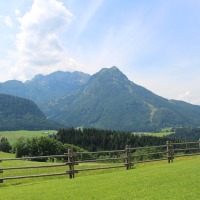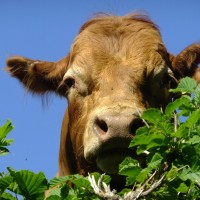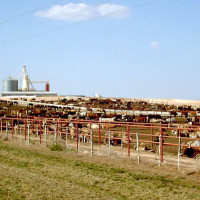

Leading Cattle in Pasture & Rotational Grazing
 Learning animal behavior can make it a lot easier for ranchers and animal handlers to guide cattle in the desired pasture areas in a stress-free way. Grazing your cattle in rotations on different pastures will allow your pasture grass to grow and recover. We know from our previous blogs that you have to get familiar with your animals before they can fully trust you, and let you into their...
Learning animal behavior can make it a lot easier for ranchers and animal handlers to guide cattle in the desired pasture areas in a stress-free way. Grazing your cattle in rotations on different pastures will allow your pasture grass to grow and recover. We know from our previous blogs that you have to get familiar with your animals before they can fully trust you, and let you into their...

Top 5 Reasons to Eat Grass-Fed Meat
 Do we eat grasses? The truth is, we do. We do eat a bit of grass when we eat corn, rice and wheat, all of which are grasses. But actually, what we eat is their seeds, the dense package of complex carbohydrates that is the specialty of annual grasses. Perennial grasses, which are more common, pack a larger proportion of their energy in their roots, stems and leaves; the building block for these...
Do we eat grasses? The truth is, we do. We do eat a bit of grass when we eat corn, rice and wheat, all of which are grasses. But actually, what we eat is their seeds, the dense package of complex carbohydrates that is the specialty of annual grasses. Perennial grasses, which are more common, pack a larger proportion of their energy in their roots, stems and leaves; the building block for these...

Health Benefits of Consuming Pasture- Raised Animals
 Posted by SLN Staff on Oct 9th, 2014 | Comments Off on Health Benefits of Consuming Pasture- Raised Animals
Posted by SLN Staff on Oct 9th, 2014 | Comments Off on Health Benefits of Consuming Pasture- Raised Animals 
 A truly sustainable livestock farm requires that your animals roam freely and forage on naturally available feed in the pasture. It has also been found through studies that the quality of meat from grass-fed and naturally raised farm fed animals, are higher in nutritional value and contain higher amounts of nutrients. They also have higher levels of unsaturated fats, including Omega-3 and...
A truly sustainable livestock farm requires that your animals roam freely and forage on naturally available feed in the pasture. It has also been found through studies that the quality of meat from grass-fed and naturally raised farm fed animals, are higher in nutritional value and contain higher amounts of nutrients. They also have higher levels of unsaturated fats, including Omega-3 and...

Proper Feeding & Nutrition of Livestock During Fall
 Posted by SLN Staff on Sep 4th, 2014 | Comments Off on Proper Feeding & Nutrition of Livestock During Fall
Posted by SLN Staff on Sep 4th, 2014 | Comments Off on Proper Feeding & Nutrition of Livestock During Fall 
 Winter and fall are the toughest seasons for animals that spend the majority of their time outside. During the late fall and winter, the water can dry up or get frozen, and the pastures can become dry or covered with snow making it difficult to find food. For small farmers, it is important to decide which animals you want to carry through the winter. Select the beef or dairy cattle you want to...
Winter and fall are the toughest seasons for animals that spend the majority of their time outside. During the late fall and winter, the water can dry up or get frozen, and the pastures can become dry or covered with snow making it difficult to find food. For small farmers, it is important to decide which animals you want to carry through the winter. Select the beef or dairy cattle you want to...

Basics of Feeding Beef Cattle – Sustainable Livestock Nutrition
 There are many misconceptions and myths regarding livestock, especially beef cattle. Beef cattle are being blamed today for everything from global warming to heart diseases, which are actually unfounded. Although they do produce methane gas, and they do contribute to high cholesterol and heart diseases if you eat a lot of them. Methane produced by livestock only account for 2.5% of the total...
There are many misconceptions and myths regarding livestock, especially beef cattle. Beef cattle are being blamed today for everything from global warming to heart diseases, which are actually unfounded. Although they do produce methane gas, and they do contribute to high cholesterol and heart diseases if you eat a lot of them. Methane produced by livestock only account for 2.5% of the total...



Powered by WordPress | Designed by Elegant Themes



